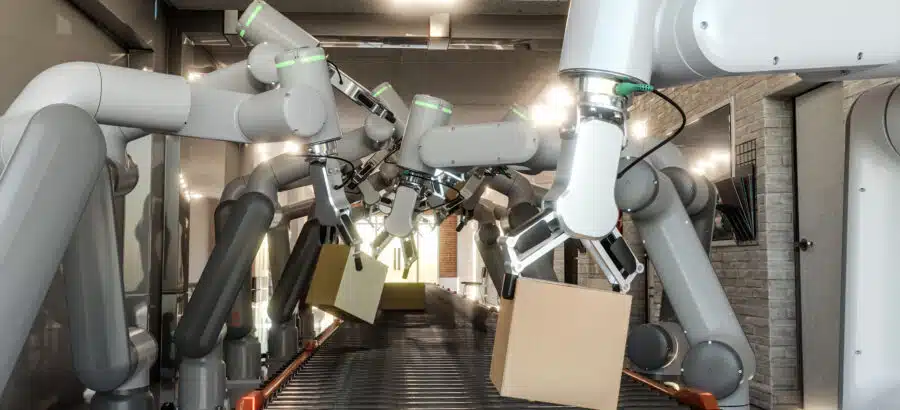The transformation to smart factories has been the biggest buzz among manufacturers in the 21st century. It’s easy to see why.
With the promise of reduced cost of production, the possibility of accurately predicting demand, improved quality control, and improved safety, it’s tough to ignore this opportunity as a manufacturer.
Smart factories are taking advantage of machine automation to optimize production. Self-sufficiency and connectivity are the most distinctive selling points of a smart factory. With the ability to easily make adjustments and self-correct, smart factories offer more flexibility than their predecessors.
The role of artificial intelligence in Factory Revolution
The smart factory revolution is solely based on the industrial internet of things concept where different components in the industry (things) can communicate with each other and share data at every step of the production process. Without analytical tools to analyze this data and make sense of it, this capability wouldn’t make much difference.
The loop will not be complete without the information technology to interpret the analysis. When the loop is complete, the result is real-time, valuable information from which informed decisions can be drawn. At the heart of all these functions is AI, without which none of these capabilities would be possible.
With artificial intelligence, we can accurately use real-time statistics to make predictions in the production process like the amount of raw materials inventory we need to hold or the production units needed for the market demand at any given time.
Machine learning is another aspect of AI that is critical in the transformation to smart factories. This element includes the machine’s ability to use the real-time data gathered to self-correct or highlight areas for human intervention where necessary. This enables constant improvement in the production process.
Though AI is continuing to evolve to be more applicable to the factory, there are some challenges that we are yet to fully navigate. To develop an ‘artificially intelligent’ system for the factory, for instance, a huge amount of the real-world data is needed beforehand, and this is not easy to gather. If the wrong data is provided, then the whole system would need to be redone.

Even with these limitations, the growing complexity of manufacturing processes globally makes the evolution to smart factories inevitable. The need for technically qualified workers who can steer the advancement is also a challenge because the educational institutions are lagging behind when it comes to preparing graduates for this work.
The current education system is not designed to cope with the dynamic technological world. Technology is responsible for the emergence of smart factories, but the social people behind the advancements are the true driving force towards the revolution.
Smart factory standard
Standards are an integral part of any production process. Smart factories are not exempt from this rule. For the smart factory to be functional, a lot of production standards need to be observed. New standards need to be developed along the way to ensure continuous improvement of the manufacturing process and support the quality of the final product.
There must be a free flow of information across all the levels of manufacturing in a smart factory to maintain a high quality of production. More standards need to be developed to make this collaboration even quicker and more effective. Maintaining these standards is a challenge to manufacturers.
Cybersecurity
One of the major obstacles of the smart factory revolution is the cybersecurity threat. With a smart factory, all the components and machines are interconnected with an anchor device that serves as the central control system. The system is very vulnerable to cyber-attacks from anywhere with such connections. One savvy hacker can shut down the entire operation.
Data theft is also another growing concern in the industry. Cyber thieves can steal private customer information from the system, which makes people hesitant to share their personal information.
All these issues make security a growing concern as manufacturers continue to transform their factories into smart factories. The dependence of the system on machines that can break down any time and completely stop the manufacturing process is also create vulnerabilities for concern.
The development of concrete security measures to deal with cyber-crimes is an important part of the transition into the smart factories of the future. Without any tangible progress in this area, a full transition will only remain a distant dream.
In the meantime, insurance against such security threats may be the only way to cushion oneself against exposure and imminent threats.
Spectrum allocation
As factory revolution takes shape, smart factories require interconnections of a large number of devices. This means that the information governance aspect of the transition requires some serious consideration. With all the wireless communication required for devices, the government will be required to allocate more commercial spectrum bands, but these are limited.
Currently, the American government states that there is enough spectrum for the development of smart factories in the near future. Should there be a surge in the number of devices exceeding the projected number, there will be a crisis.
Ensuring that there is no interference in the smooth running of the smart factories is another administrative challenge for the government.
These are issues that need to be addressed if there will be a successful transition not only in the US, but also in other countries hoping to make the transition.





